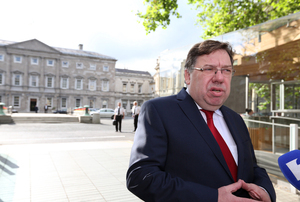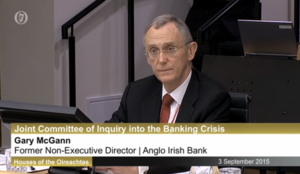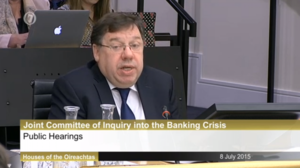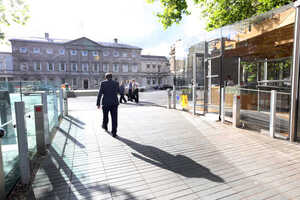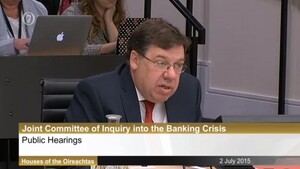The timeline to the bank guarantee.
“Standards and Poor, the credit rating agency, gave an unfavourable rating for Ireland in August 2010 when Irish bond yields, Irish Government bond yields increased sharply. At the end of September 2010, the Government announced its intention to withdraw from the markets as a tactical move since we were fully funded until mid-2011.
At the end of September, higher costs of the bank when the recapitalisation programme were announced. Mid-October, Chancellor Merkel and President Sarkozy declared that a new permanent Europe-area financial rescue fund was to be set up by 2013 and would require private sector creditors to accept some debt restructuring.
This statement was known as the Deauville Declaration. It was clarified afterwards that the debt-restructuring provision would only apply to new debt after 2013. The original statement had caused further market jitters and the damage was done and bond yields jumped further.
We’d indicated in September 2010 that the EU Commission and the ECB that we were preparing a four-year national recovery plan to be published in November, prior to the Budget which would show that we were committed to an adjustment programme and that we’d bring the Budget deficit down below 3% by 2014.
On the fourth of October, Minister Lenihan received a letter from the ECB president expressing concern about the situation of Irish banks.
On the 8th of November, the EU Commissioner Ollie Rehn visited Dublin and on the 11th of November the bond yield rose to 8.6%. And Governor Honohan suggested that bond yields would fall to more sustainable levels if the planned fiscal adjustment was implemented.
On the 12th of November, the ECB governing council decided that it could not sustain its large exposure to Irish banks. On the same day, ECB/EU sources commenced off-the-record media briefings, leading to reports that Ireland would need a bailout and discussions were underway.”
On the 13th of November, there were internal discussions with myself and Minister Lenihan and key officials.
We were clear that if discussions were to take place, it would be, if you like, talks about talks, in other words, we made no commitment at that point of formerly applying for assistance until we were satisfied of what the authorities had in mind and the conditionality attached to it.
The off-the-record briefings were clearly trying to play the situation where a formal Irish approach for assistance was being portrayed as a fait accompli by those informed sources without prior agreement and conditionality. This was unacceptable to us.
We were not against exploring the issues with the EU authorities but neither should they presume or anticipate what decision the Irish Government would make. We wanted to know what they had in mind before we would indicate what decision we would be able to take. We were looking to explore what possibilities there were before giving our considered view.
At the Cabinet meeting on the 16th of November, the Cabinet was brought up to date about the situation that was developing. I did not like the continuous anonymous briefing against Ireland, which I saw as an attempt to bounce us into a decision before we got further clarification.
At the end of a meeting in Brussels on a Tuesday of that week was a conclusion, the council’s published conclusion that an EU delegation with IMF staff joined them for the first time would travel to Dublin to continue consultations. I underestimated the impact of the IMF coming to town however which immediately sent a message that this was now a done deal rather than a genuine continuation of existing discussions up to that.”
This perception was further reinforced when the Central Bank governor gave an interview on RTE from Frankfurt on the morning of the meeting in Dublin by saying that, while it was a matter for the Government in the first instance, he said he believed a deal would be done and a loan would be agreed.
This development showed the Government in a bad light because the interpretation given to events that we were keeping what was going on away from people. In fact, we were trying to put ourselves in the best position we could before any questions of formally requesting assistance.
We wanted to know exactly what we were getting before we agreed to formally apply for a programme. On the 19th of November, the ECB president, Mr Trichet sent a letter to Minister Lenihan threatening withdrawal of ECB funds in the absence of a formal bailout request.
This was not well received by us. We knew that providing a fiscal framework, under the EU/IMF programme gave us access to funds at a cost cheaper than was available on the markets at that time and into the future. It would provide, in that respect, funding certainty over a three-year period that therefore gave a better prospect to implement the plan we announced, we were announcing.”
We knew that it would be difficult but the plan was robust and rigorous and we were confident that the growth prospects in it were achievable and could complete the journey begun in 2008, to try and turn the country around. We had a Government meeting on Sunday, the 21st of November and made the decision to formally request EU/IMF assistance.
Based on the progress that had been made in Dublin we decided to formally enter talks. Efforts had been made from time to time to put our corporation tax rate on the agenda, which we refused to countenance.
We were adamant that our own four-year national recovery plan which was approved by the Government, before its detail was shown to the European authorities, would form the basis of any programme we would agree. We were determined to meet our responsibilities and build on the three budgets we’d already introduced.”
Brian Cowen at the banking inquiry this morning.


